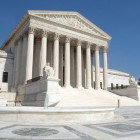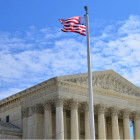
Miller v. Alabama: One Year Later
|
Last year, the Supreme Court declared mandatory life without parole sentences for juveniles to be unconstitutional. A year after the landmark ruling, how have the nation’s juvenile justice systems been impacted?
Juvenile Justice Information Exchange (https://jjie.org/author/james-swift/page/6/)

Last year, the Supreme Court declared mandatory life without parole sentences for juveniles to be unconstitutional. A year after the landmark ruling, how have the nation’s juvenile justice systems been impacted?

The Supreme Court issued its long-awaited ruling Monday in Fisher v. University of Texas, a case with broad implications on the use of affirmative action policies in college admissions processes. In a 7-1 ruling, the Supreme Court vacated and remanded an earlier Court of Appeals judgment after affirming the limited use of racially-based factors in university admissions. The case involves Abigail Fisher, a white Sugar Land, Texas, resident whose 2008, University of Texas application was rejected. Fisher, then a high school senior, later sued the university, claiming her application was denied because of the university’s use of affirmative action policies. Although the ruling says the policies must be strictly reviewed, the ruling does not forbid universities from using affirmative action policies.

The G.A. Dept. of Juvenile Justice Commissioner announced Thursday the suspension with pay of 20 DJJ investigators.

Texas may soon come into compliance with last year’s Supreme Court ruling barring states from sentencing juveniles under 18 to mandatory life without parole.

Juvenile court judges and their clerks in Massachusetts will see more money in their paychecks in 2014 thanks to a provision in the recently passed $34 billion budget. The phased-in salary increases, the first for judges and clerks since 2006, will total $23 million annually, about 2 percent of the 2014 budget. The budget will increase the salaries of regular associate judges from nearly $130,000 annually to almost $160,000 -- an increase of approximately 23 percent. The Republican reports that under the new budget -- which Gov. Deval Patrick said he will sign next month -- trial court clerk salaries will increase by 22 percent, from $110,000 to approximately $135,000. Assistant court clerks will see their salaries increase by nearly $19,000, and first assistant clerks by $20,000.

A report released last week by the Tennessee Commission on Children and Youth calls for the state’s Dept. of Children’s Services to step up its efforts in meeting the needs of young people with psychological and other health problems.

Following the release of a recent Bureau of Justice Statistics (BJS) report, Georgia Department of Juvenile Justice Commissioner Avery D. Niles released an official statement responding to the report’s claims that the state’s juvenile facilities post among the highest rates of sexual victimization in the nation.

The United States Bureau of Justice Statistics (BJS) has released a new report detailing rates of sexual victimization in the nation’s juvenile facilities.
The report, incorporating data from the 2012 National Survey of Youth in Custody, found that nearly one in 10 young people in state-operated or state-contracted juvenile facilities reported at least one sexual victimization incident last year.

A new law in a Wisconsin town will force the parents of bullies to pony up for their children’s taunting and teasing.

State legislation proposing to cut the number of juvenile judges from six to four was narrowly defeated Tuesday in a committee vote.